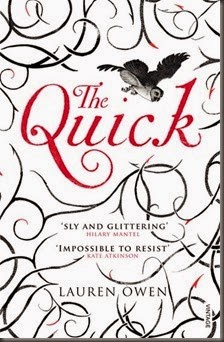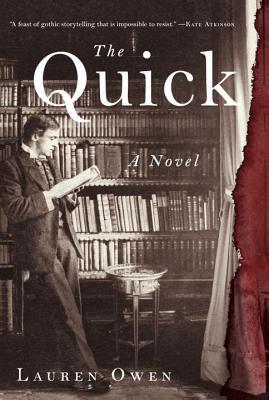People complain that they’re sick of vampires, that they’re overdone or just done, and I can understand that. There have been a lot of (ahem) pale imitations of Stoker and Rice, far more than good and original vampire fiction. But I’ll never really get tired of vampires, the same way I’ll never get tired of dragons and princesses and trolls under bridges. It’s not about the monster; the monster is iconic and eternal. It’s about the execution.
The Quick is an admirable addition to the genre, and a compelling debut from Lauren Owen. The prose is excellent, neither too modern nor too fussily archaic, just right for the late Victorian setting. It’s swift and clever and full of menace, even if it doesn’t tip over the line into truly frightening. It’s more of an atmospheric novel, one that sinks you into the clammy London fog and whispers about what’s lurking there.
What’s lurking, in part, are nefariously wealthy monsters–vampires who prey on society in more ways than one, but also harbor hopes of guiding it and improving it. They’re locked in an old, bitter stalemate with the lower class vampires, who are more focused on survival, and with the Quick, otherwise known as the living, whom they hold in deep contempt. James, a shy and neurotic writer, and Charlotte, his sister, stumble upon this hidden hive of supernatural activity and are forced to fight for their lives against both factions. They are joined by professional defenders against the undead, a rather overenthusiastic American (is there any other kind?), and a few vampires of uncertain loyalties.
Also at their disposal is something that most vampire heroes and heroines lack: the knowledge of what a vampire is. And thank every god and devil that they do, because more than vampires, I’m sick of the discovery process and the tortured self-pity that follows. “Oh, woe is me, I’m a monster, how shall I reconcile my sexy new murderous hungers with Victorian propriety? …oh, wait, Victorians were warmongering colonialists. Never mind!” Owen dispenses with that nonsense and gets right to the good stuff, letting Charlotte and James dive right into vengeance and violence.
Their mutual devotion, while compelling, was nonetheless a little perplexing, given that we had not actually seen them interact since the prologue. The extraordinary lengths to which they go, risking life and after-life for each other, are built upon very generic motivations. They’re siblings! That means they’ll do anything for each other! Yeah, I know plenty of siblings for whom that’s not the case, and based on that sole glimpse we get in the prologue, things really could go either way for James and Charlotte.
Charlotte’s absence is particularly noteworthy. Not only is she not very present in James’s life, she’s not very present at all. The prologue is deceptive for featuring her: when it’s over, we go about two hundred pages before she appears again. And why? Perhaps the author felt that her story would not be as interesting to readers: while James is off in London becoming a writer, she is forced to stay with an elderly relative who is “afraid of things” (a 19th century way of describing a sufferer of hypochondria, or perhaps OCD). Charlotte is already described as adventurous and confident, so that seems a special hell. How on earth did she cope? There isn’t enough psychology here, which is strange because Owen is quite good at it when it comes to other characters. Owen is also extremely sensitive to the realities of 1890’s England, with its social inequities and gender imbalances, and yet we hear little about the unfairness of Charlotte’s situation as de facto nursemaid while her brother has his freedom as a matter of course.
The novel has issues with pacing in general, but they’re not the deadly sort. I never felt that Owen lingered too long on anything–I simply wanted more. More on the rather sudden (though beautifully executed) demise of a few characters–more on Charlotte’s life–more on lives of peripheral characters who were friends or thralls or both. They all come together by the end, but sometimes their motivations are obscure, freeing or fighting each other because the plot seems to demand it, not because the characters do.
Perhaps this book suffered more from its editor than its author. I have a feeling that scenes were abbreviated or excised for the sake of marketability–this is already a substantial book, a softcover coming in at about 550 pages, and while everyone wants a piece of the Jonathan Strange and Mr Norrell pie, nobody wants to look like a cheap imitator.
This isn’t, though. It’s thoroughly innovative and full of wonderful characters. These flaws indicate to me that Lauren Owen is a very talented author who has written her first book, and is still learning. I look forward to seeing how she improves, and will certainly be picking up her next book to place next to The Quick on my shelf.


